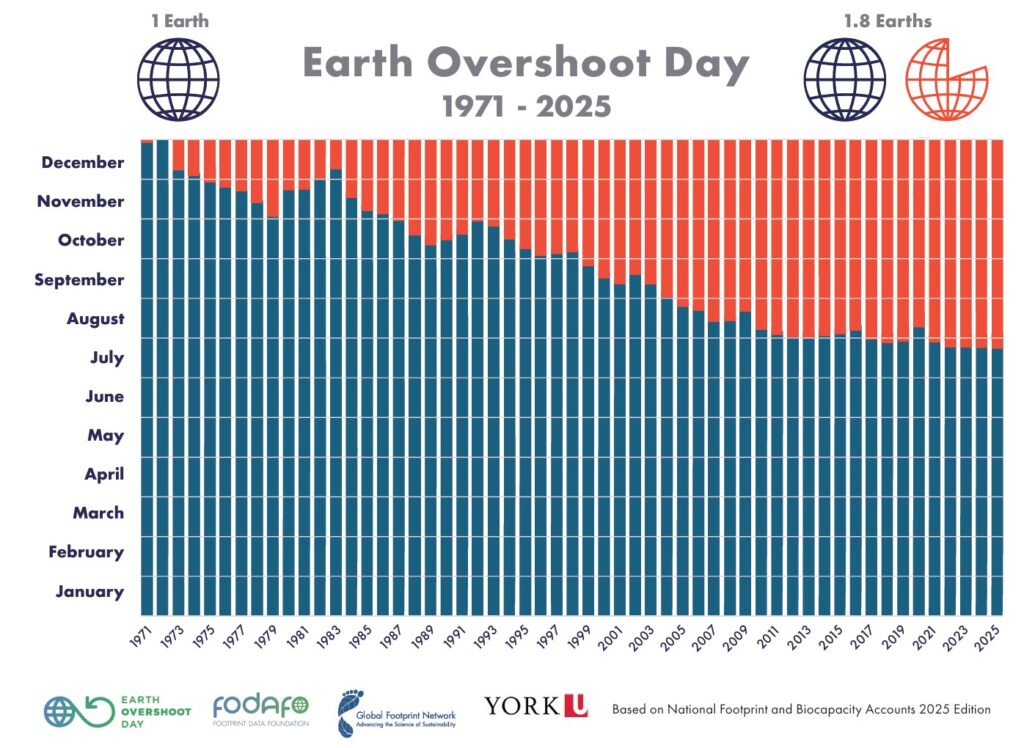
To determine the date of Earth Overshoot Day for each year, Global Footprint Network calculates the number of days of that year that Earth’s biocapacity suffices to provide for humanity’s Ecological Footprint. The remainder of the year corresponds to global overshoot. Earth Overshoot Day is computed by dividing the planet’s biocapacity (the amount of ecological resources Earth is able to regenerate that year), by humanity’s Ecological Footprint (humanity’s demand for that year), and multiplying by 365, the number of days in a year (or 366 days in a leap year, as for 2024 or 2028):
(Planet’s Biocapacity / Humanity’s Ecological Footprint) x 365 = Earth Overshoot Day
Global Ecological Footprint and biocapacity metrics are calculated each year in the National Footprint and Biocapacity Accounts. Using UN statistics, these accounts incorporate the latest data and the most updated accounting methodology (the National Footprint and Biocapacity Accounts 2025 Edition up t0 2022, plus additional data to estimate the latest years) To estimate this year’s Earth Overshoot Day, Ecological Footprint and biocapacity are “nowcasted” to the current year using the latest data from additional sources, such as the Global Carbon Project.
To maintain consistency with the latest reported data and science, the Ecological Footprint metrics for all past years since 1961 (the earliest year data is available) are recalculated every year, so each year’s metrics share a common data set and the exact same accounting method. The annual dates of Earth Overshoot Day are recalculated accordingly.
Consequently, it is inaccurate to simply look at media accounts from previous years to determine past Earth Overshoot Days. Indeed, a true apples-to-apples comparison of Earth Overshoot Days can only be made using the same edition of the National Footprint and Biocapacity Accounts. For instance, it would make no sense to compare the date of Earth Overshoot Day 2007 as it was calculated that year—and reported by the media at the time—with the date of Earth Overshoot Day 2025, because improved historical data and new findings such as lower net carbon sequestration by forests have slightly shifted the results. Even a few percentage points change can shift the date of Earth Overshoot Day by a good number of days. Therefore, for time trends, consult the Footprint Data Platform.
Given the cumulative effect of overshoot, which leads to a build-up of this deficit into a debt, the precise Earth Overshoot Day date for each year is less significant than the magnitude of the ecological overshoot. The overall trend of the date progression year over year—which, as you now understand, is identical to that of the ratio of humanity’s Ecological Footprint to our planet’s biocapacity. Over the last decade, the date has been staying more steady. This means that humanity is adding further damage to the biosphere at constant rate.
The recalculated dates of past Earth Overshoot Days, as determined with and extended from the National Footprint and Biocapacity Accounts 2025 Edition, are:
December 29, 1971
December 31, 1972
December 8, 1973
December 4, 1974
November 29, 1975
November 25, 1976
November 22, 1977
November 13, 1978
November 3, 1979
November 23, 1980
November 24, 1981
December 2, 1982
December 9, 1983
November 17, 1984
November 7, 1985
November 5, 1986
October 31, 1987
October 17, 1988
October 12, 1989
October 16, 1990
October 20, 1991
October 30, 1992
October 26, 1993
October 16, 1994
October 9, 1995
October 3, 1996
October 5, 1997
October 6, 1998
September 25, 1999
September 16, 2000
September 11, 2001
September 19, 2002
September 12, 2003
September 1, 2004
August 25, 2005
August 22, 2006
August 14, 2007
August 14, 2008
August 22, 2009
August 8, 2010
August 4, 2011
August 1, 2012
August 1, 2013
August 3, 2014
August 4, 2015
August 6, 2016
August 1, 2017
July 28, 2018
July 29, 2019
August 9, 2020
July 29, 2021
July 25, 2022
July 25, 2023
July 25, 2024
July 24, 2025
